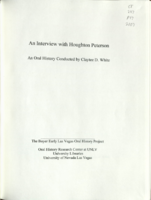Search the Special Collections and Archives Portal
Search Results

Transcript of interview with Clark Crocker by Monica Lehman, March 3, 1978
Date
Archival Collection
Description
On March 3, 1978, Monica Lehman interviewed Clark Crocker (born 1920 in Westfield, Massachusetts) about his experiences while living in Nevada. Crocker first talks about his family and educational background before describing his experiences from going to school in both California and Massachusetts. Crocker then describes what he knows about the building of Hoover Dam and later talks about his career as a teacher and school principal. The two also discuss Crocker’s hobbies and volunteer work, including that for the fire department in Pahrump, and they later discuss Crocker’s experiences as both a frogman and navigator for the United States Navy during World War II. The interview concludes with some of Crocker’s thoughts and philosophies on how curriculum should be structured in schools.
Text

Irene Cepeda interview, April 24, 2019: transcript
Date
Description
Interviewed by Monserrath Hernández, Nathalie Martinez and Rodrigo Vázquez. Irene Cepeda is a woman dedicated to serving the Latinx as well as all minority groups in education in Southern Nevada. As a Las Vegas native, she grew up alongside the Latinx community here and is a proud Latina from Nicaraguan roots. She is dedicated to uplifting the Latinx community through her work with the Latino Youth Leadership Conference and college access specialist at Nevada State College. Now, as representative of District D on the Clark County School District Board of Trustees, she seeks to tackle the issues the district faces from acts of White supremacy to a lack of funding for English Language Learner families.
Text

Transcript of interview with Houghton Hoot Peterson by Claytee White, May 20, 2010
Date
Archival Collection
Description
Houghton Hoot Peterson played trombone in his high school band in northern Minnesota where he grew up. That same instrument would lead him to be a member of the highly regarded Air Force jazz band called Airmen of Note after enlistment. Then during a short tour at Nellis Air Force base, Hoot decided that the Las Vegas entertainment scene might have career opportunities for him. He moved to Las Vegas in 1962, an era of celebrity performers and tourists who enjoyed the crowds and nightlife. Hoot's point of view was as a musician in the band, most often a Strip relief band. But he also has tales of famous musicians and late night jam sessions. Hoot's career spanned 20 years. Eventually the Las Vegas scene for live musicians began to change. When times got tough for Hoot, he worked as a carpenter and at a music store. In this interview he discusses his fascinating past and offers advice for today's musicians.
Text

Richard W. Bunker Interview, July 18, 2017, July 21, 2017, and September 28. 2017: transcript
Date
Archival Collection
Description
Fourth-generation Nevadan, Las Vegas native, and great grandson of Mormon pioneer Edward Bunker, Richard W. Bunker knows Southern Nevada as few others do. For example, when Richard Bunker speaks of water, he talks about his father's family leaving their home after the completion of Hoover Dam because their little town of St. Thomas was submerged in the rising waters of Lake Mead; he recalls swimming at the Old Ranch pool, the Springs, and the Mermaid pool; he shares stories of hiring Pat Mulroy, mentoring her, and encouraging her to apply to lead the Las Vegas Valley Water District; he mentions the Dunes and its two fresh-water wells, the Sanitation District and wastewater treatment. Few others have actively shaped Southern Nevada as Richard Bunker has through his lengthy career as a lobbyist (1973–2000); assistant manager for City of Las Vegas (1973–77); Clark County Manager (1977–79); member and Chair of the Nevada Gaming Control Board (1980–1982); executive director (1988-1990) and
Text

Transcript of interview with Dedee (DaVeen) Nave by Claytee D. White, June 8, 2015
Date
Archival Collection
Description
Dedee (DaVeen) Nave reveals a life filled with distinguished results in the cultural evolution of Las Vegas since her move to the valley in 1971. She was a young bride and soon a mother when she arrived with her can-do energies. She was a trained educator who was eagerly looked outside the classroom for a way to make a difference in the community when she took a position with the Camp Fire Girls Over the following decades, the impact of involving Dedee in many valued projects is evident. In this interview, she provides a glimpse into her various aptitudes and the many people she has worked with to great results. Dedee Nave was born DaVeen Maurer in 1948 in Indianapolis, Indiana, to David and Virginia Maurer and has a sister, Marilyn Maurer MacCollum. Their mother was a convert to Judaism who instilled them with a solid Judeo-Christian foundation. When Dedee became the bride of a mixed marriage, she raised her daughter Alisa in the Jewish faith. Alisa, who is married to Robb Worth, is a practicing attorney in Las Vegas. A graduate of Stephens College in Columbia, Missouri, Dedee studied fine arts, considered being a theater major, modified her plans and became a skilled organizer of people and projects. This ability to envision, implement, and fundraise is seen in Dedee?s distinguished list of community programs, among them her work with: the City of Las Vegas Arts Commission; two terms on the Nevada State Arts Council; a past president of the Junior League of Las Vegas; former chairperson of the Junior League?s Endowment Fund Trustees; Lied Discovery Children?s Museum opening; and chairperson of Morelli House Public Program and many other initiatives.
Text

Transcript of interview with Lt. Harry Fagel by Barbara Tabach, April 15, 2016 and January 13, 2017
Date
Archival Collection
Description
In the signature line of Harry Fagel?s emails is a reads: Be the light in dark spaces. This illumines the person that Harry is both as a police officer and a poet in Las Vegas. Harry is native Las Vegan, who has served the community with the Las Vegas Metropolitan Police Department for nearly 30 years. He currently is a police lieutenant serving in Laughlin, Nevada. In addition, Fagel is a respected poet, writing both for the public and on commission. He performs in the local poetry scene. He also has showcased his poetry in two published books, released an album, and is a recipient of the Hilliard Endowment Grant from the University Nevada, Reno. Fagel is a graduate of the University of Nevada, Las Vegas, and currently lives in Henderson with his wife, Leilani and two sons, Sam and Jake. In this interview, Fagel discusses his family background, how his grandparents came to live in Las Vegas in the 1950s, as well as his relationships with both his mother and father. He recalls his early jobs which included working for his cousin Freddie Glusman?s restaurant Piero?s and for Circus Circus-long before becoming a policeman. His involvement with the Jewish community started young and he shares how it has evolved over the decades. In addition, Fagel reflects upon his career as a law enforcement officer, the progressiveness of the Las Vegas Metropolitan Police Department, and changes in relations between the police and communities, both locally and nationally. Lastly, Fagel talks in detail about his poetry, its dominant themes, and the local poetry scene.
Text

Transcript of interview with Jay Poster by Barbara Tabach, August 26, 2016
Date
Archival Collection
Description
Music brought Jay Poster to Las Vegas for a brief time in 1974. Jay wanted to pursue a musical career and his cousin was a professional musician with the Nat Brandwynne Orchestra at Caesars Palace. To Jay?s disappointment, within a few months his cousin Jack Poster left Las Vegas for a road tour. So Jay decided his best strategy was to return home to San Diego and his studies at San Diego State University. It would be over a decade later before Jay returned to Las Vegas to live and this time it became permanent. This time it was not for music. For beyond his musical talent, Jay had a gift for connecting with people of all of ages and walks of life. He was good at sales and his day job selling office furniture offered him the opportunity to transfer to Las Vegas in 1986. Within a few years, however, it was a recruiter for Palm Mortuaries who introduced Jay to his defining career moment and to Allen Brewster, a prominent Jewish leader and founder of King David Cemetery and Mortuary. It was 2001. Jay has been King David?s ever since and is the General Manager. In this interview, Jay describes his personal and spiritual growth through his career in funeral services and his respect for the Jewish traditions of burial and grieving. In addition, his passion for music has also soared and he talks about his participation in the Shabbatones at Congregation Ner Tamid and Desert Winds, a community based performance organization. He shares his love of traditional Jewish klezmer music and the Meshugginah Klezmorim.
Text

Transcript of interview with Rabbi Sanford Akselrad by Barbara Tabach, October 29, 2014
Date
Archival Collection
Description
Sanford Akselrad is the rabbi at Congregation Ner Tamid. In this interview he describes his rabbinical training, coming to Las Vegas, and the growth of the congregation.
More inclined in his youth to pursue a career as a scientist than rabbi, Sanford Akselrad (1957- ) became the rabbi at Congregation Ner Tamid in 1988. Turning his tenure, Rabbi Akselrad has lead the congregation through its move from Emerson to Street to its permanent home on Green Valley Parkway and I-215 and shares a fun story about buying desks and chairs from the Clark County School District. He talks about many of the milestones including: Project Ezra which he started during the 2008 recession to help Jewish community members find jobs; the NextGen program which was initiated to bring young adults in their twenties and thirties back to the temple. For over twenty years Rabbi Akselrad was a member of the board of the Nevada Governor?s Council on Holocaust education, a topic that was the focus of his rabbinical thesis. He was the founding president of the Clark County Board of Rabbis and has served on the boards of the Jewish Federation of Las Vegas, Jewish Family Services, and the Humana Hospital Pastoral Advisory Board. He was also the chair of the Federation?s Community Relations Council (CRC). Rabbi Akselrad is a board member of the Anti-Defamation League Nevada region office and the Interfaith Council of Southern Nevada. Sanford Akselrad was born on October 6, 1957 in Oakland, California and raised in Palo Alto. He attended the University of California, Los Angeles and then went to graduate school at the Hebrew Union College Jewish Institute of Religion. He spent the first year of his graduate program in Israel, the next two in Los Angeles, and the final two years in Cincinnati, Ohio. Rabbi Akselrad met his wife Joni in Reno, Nevada and married her during his third year of rabbinical school. The couple has two children, CJ and Sam. After his ordination in 1984, Rabbi Akselrad was associate rabbi of Temple Israel in Columbus, Ohio, one of the largest Reform congregations in the Midwest. His choice of career was inspired by his father, Sidney Akselrad, who was a prominent rabbi involved in social justice issues and the Civil Rights Movement. Sanford Akselrad has followed his father?s example of community involvement, both in Las Vegas and on a national level: he served on the board of the National Conference of Community and Justice (NCJJ), he was chair of the NCJJ's Inter-faith Council, and he is active in the Union of Reform Judaism (URJ).
Text

Transcript of interview with Kathleen Bryan Gaston by Niki Rodriguez, March 17, 1981
Date
Archival Collection
Description
On March 17, 1981, Niki Rodriguez interviewed Kathleen Bryan Gaston (born 1949 in Las Vegas, Nevada) about her experience living in Southern Nevada. Gaston first talks about her father who moved to Las Vegas and eventually became a justice of the peace, and she also describes how her parents eventually moved to Las Vegas. Gaston later describes how Las Vegas looked as she was growing up and how it has developed since, specifically mentioning the schools she attended and the growth of the Las Vegas Strip.
Text

Transcript of interview with Doris Evans by Lance Kenny, March 12, 1977
Date
Archival Collection
Description
On March 12, 1977, Lance Kenny interviewed realtor, Doris Evans (born in Dexter, Missouri) at her place of business, Doris Evans Realty, located at 1100 Cahlan Drive, Las Vegas, Nevada. This interview covers Boulder City and Las Vegas [1937-1977]. During the interview Doris discusses real estate, local hotels, early transportation, and social recreation. She also mentions the nuclear tests, crime, environmental changes, and marriage and family life in Boulder City and Las Vegas. Doris’s business partner, Patty (Renette Beringer), is also present during the interview and helps Doris recall the year they started Doris Evans Realty in Las Vegas, Nevada.
Text
